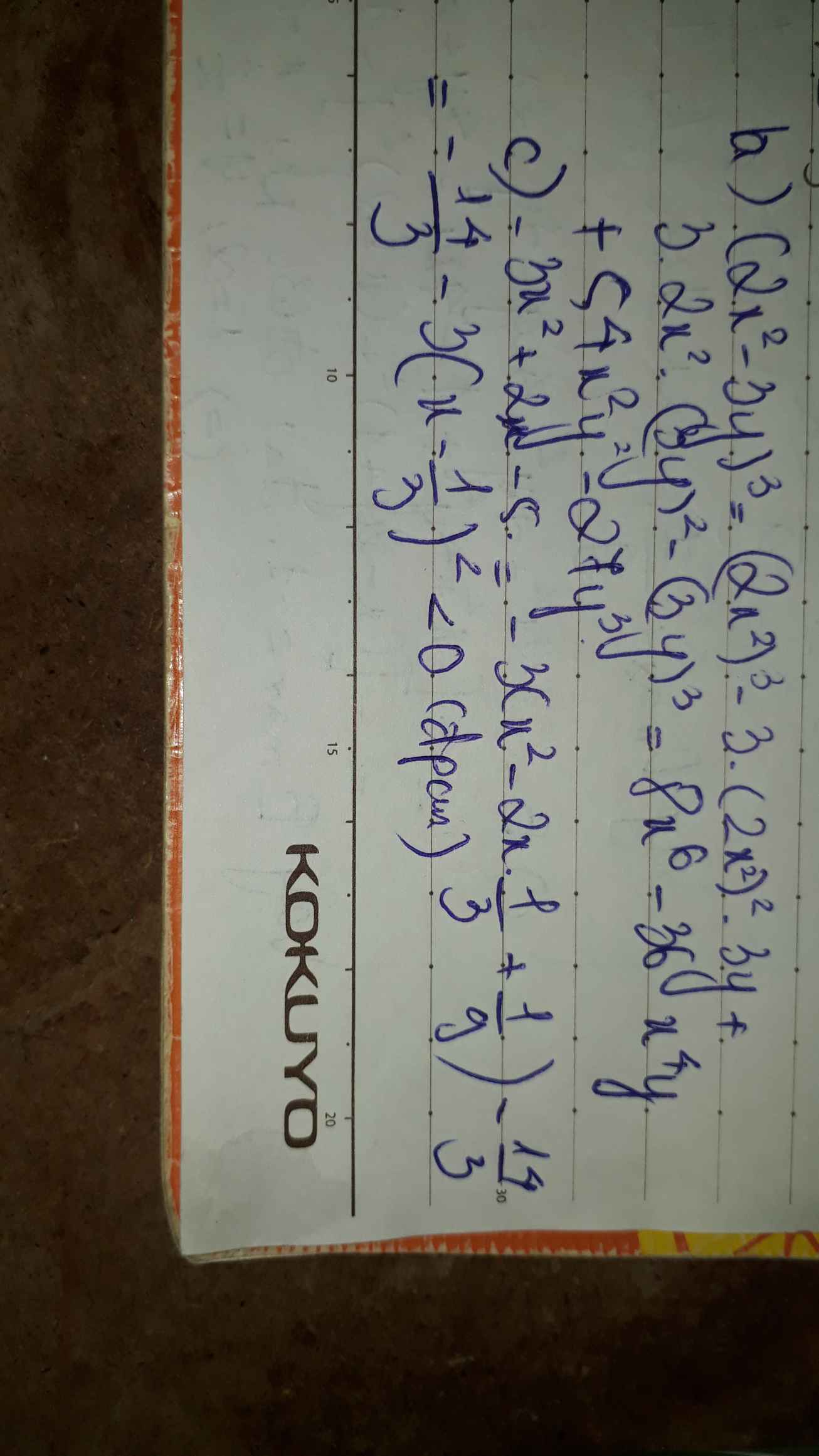
Hãy nhập câu hỏi của bạn vào đây, nếu là tài khoản VIP, bạn sẽ được ưu tiên trả lời.


a, \(2x\left(x-3\right)-15+5x=0\\ \Rightarrow2x\left(x-3\right)-\left(15-5x\right)=0\\ \Rightarrow2x\left(x-3\right)-5\left(3-x\right)=0\\ \Rightarrow\left(2x+5\right)\left(x-3\right)=0\\ \Rightarrow\left[{}\begin{matrix}x=-\dfrac{5}{2}\\x=3\end{matrix}\right.\)
b, \(x^3-7x=0\\ \Rightarrow x\left(x^2-7\right)=0\\ \Rightarrow\left[{}\begin{matrix}x=0\\x=\pm7\end{matrix}\right.\)
c, \(\left(2x-3\right)^2-\left(x+5\right)^2=0\\ \Rightarrow\left(2x-3-x-5\right)\left(2x-3+x+5\right)=0\\ \Rightarrow\left(x-8\right)\left(3x+2\right)=0\\ \Rightarrow\left[{}\begin{matrix}x=8\\x=-\dfrac{2}{3}\end{matrix}\right.\)
Xem lại đề câu d

a) x(x - 5) - 4x + 20 = 0
\(\Leftrightarrow\) x(x - 5) - (4x + 20)
\(\Leftrightarrow\) x(x - 5) - 4(x - 5) = 0
\(\Leftrightarrow\) (x - 5)(x - 4)
Khi x - 5 = 0 hoặc x - 4 = 0
\(\Leftrightarrow\) x = 5 \(\Leftrightarrow\) x = 4
Vậy S = \(\left\{5;4\right\}\)
b) x(x + 6) - 7x - 42 = 0
\(\Leftrightarrow\) x(x + 6) - (7x - 42) = 0
\(\Leftrightarrow\) x(x + 6) - 7(x + 6) = 0
\(\Leftrightarrow\) (x + 6)(x - 7) = 0
Khi x - 6 = 0 hoặc x - 7 = 0
\(\Leftrightarrow\) x = 6 \(\Leftrightarrow\) x = 7
Vậy S = \(\left\{6;7\right\}\)
c) x3 - 5x2 - x + 5 = 0
\(\Leftrightarrow\) (x3 - 5x2) - (x + 5) = 0
\(\Leftrightarrow\) x2 (x - 5) - (x - 5) = 0
\(\Leftrightarrow\) (x - 5)(x2 - 1) = 0
\(\Leftrightarrow\) (x - 5)(x - 1)(x + 1) = 0
Khi x - 5 = 0 hoặc x - 1 = 0 hoặc x + 1 = 0
\(\Leftrightarrow\) x = 5 \(\Leftrightarrow\) x = 1 \(\Leftrightarrow\) x = -1
Vậy S = \(\left\{5;1;-1\right\}\)
d) 4x2 - 25 - (2x - 5)(3x + 7) = 0
\(\Leftrightarrow\) (2x)2 - 52 - (2x - 5)(3x + 7) = 0
\(\Leftrightarrow\) (2x - 5)(2x + 5) - (2x - 5)(3x + 7) = 0
\(\Leftrightarrow\) (2x - 5) \([\left(2x+5\right)-\left(3x+7\right)]\) = 0
\(\Leftrightarrow\) (2x - 5) ( 2x + 5 - 3x + 7) = 0
\(\Leftrightarrow\) (2x - 5)( -x + 12) = 0
Khi 2x - 5 = 0 hoặc -x + 12 = 0
\(\Leftrightarrow\) 2x = 5 \(\Leftrightarrow\) -x = -12
\(\Leftrightarrow\) x = \(\dfrac{5}{2}\) \(\Leftrightarrow\) x = 12
Vậy S = \(\left\{\dfrac{5}{2};12\right\}\)
e) x3 + 27 + (x + 3)(x - 9) = 0
\(\Leftrightarrow\) x3 - 33 + (x + 3)(x - 9) = 0
\(\Leftrightarrow\) (x - 3)(x2 - 3x + 9) + (x + 3)(x - 9) = 0
\(\Leftrightarrow\) (x - 3) \(\left[\left(x^2-3x+9\right)+\left(x-9\right)\right]\) = 0
\(\Leftrightarrow\) (x - 3) ( x2 - 3x + 9 + x - 9) = 0
\(\Leftrightarrow\) (x - 3)(x2 - 2x) = 0
\(\Leftrightarrow\) (x - 3)x(x - 2)
Khi x - 3 = 0 hoặc x = 0 hoặc x - 2 = 0
\(\Leftrightarrow\) x = 3 \(\Leftrightarrow\) x = 2
Vậy S = \(\left\{3;0;2\right\}\)
Chúc bạn học tốt
a) Ta có: \(x\left(x-5\right)-4x+20=0\)
\(\Leftrightarrow\left(x-5\right)\left(x-4\right)=0\)
\(\Leftrightarrow\left[{}\begin{matrix}x=5\\x=4\end{matrix}\right.\)
b) Ta có: \(x\left(x+6\right)-7x-42=0\)
\(\Leftrightarrow x\left(x+6\right)-7\left(x+6\right)=0\)
\(\Leftrightarrow\left(x+6\right)\left(x-7\right)=0\)
\(\Leftrightarrow\left[{}\begin{matrix}x=-6\\x=7\end{matrix}\right.\)

\(a,\Leftrightarrow25x^2-70x+49-25x^2=32\\ \Leftrightarrow-70x=-17\Leftrightarrow x=\dfrac{17}{70}\\ b,\Leftrightarrow x^2-6x+9+x^2+2x+1-5=0\\ \Leftrightarrow2x^2-4x+5=0\\ \Leftrightarrow2\left(x^2-2x+1\right)+3=0\\ \Leftrightarrow2\left(x-1\right)^2=-3\Leftrightarrow\left(x-1\right)^2=-\dfrac{3}{2}\left(\text{vô lí}\right)\\ \Leftrightarrow x\in\varnothing\)

2:
a: =>x-1=0 hoặc 3x+1=0
=>x=1 hoặc x=-1/3
b: =>x-5=0 hoặc 7-x=0
=>x=5 hoặc x=7
c: =>\(\left[{}\begin{matrix}x-1=0\\x+5=0\\3x-8=0\end{matrix}\right.\Leftrightarrow x\in\left\{1;-5;\dfrac{8}{3}\right\}\)
d: =>x=0 hoặc x^2-1=0
=>\(x\in\left\{0;1;-1\right\}\)

a: 3(x+7)-2x+5>0
=>3x+21-2x+5>0
=>x+26>0
=>x>-26
Sửa đề: \(\dfrac{x+2}{18}-\dfrac{x+3}{8}< \dfrac{x-1}{9}-\dfrac{x-4}{24}\)
=>\(\dfrac{4\left(x+2\right)}{72}-\dfrac{9\left(x+3\right)}{72}< \dfrac{8\left(x-1\right)}{72}< \dfrac{3\left(x-4\right)}{72}\)
=>\(4\left(x+2\right)-9\left(x+3\right)< 8\left(x-1\right)-3\left(x-4\right)\)
=>\(4x+8-9x-27< 8x-8-3x+12\)
=>-5x-19<5x+4
=>-10x<23
=>\(x>-\dfrac{23}{10}\)
b: \(3x+2+\left|x+5\right|=0\left(1\right)\)
TH1: x>=-5
(1) trở thành: 3x+2+x+5=0
=>4x+7=0
=>\(x=-\dfrac{7}{4}\left(nhận\right)\)
TH2: x<-5
=>x+5<0
=>|x+5|=-x-5
Phương trình (1) sẽ trở thành:
\(3x+2-x-5=0\)
=>2x-3=0
=>2x=3
=>\(x=\dfrac{3}{2}\)

\(A=x^3-2x+n\)
\(B=n-2\)
\(A\text{⋮}B\) ⇒ \(\left(x^3-2x+n\right)\text{⋮}\left(n-2\right)\)
⇒ \(\left[\left(x^3-2x^2\right)+\left(2x^2-4x\right)+\left(2x-4\right)+\left(n+4\right)\right]\text{⋮}\left(n-2\right)\)
⇒ \(\left[x^2\left(x-2\right)+2x\left(x-2\right)+2\left(x-2\right)+\left(n+4\right)\right]\text{⋮}\left(n-2\right)\)
⇒ \(\left[\left(x-2\right)\left(x^2+2x+2\right)+\left(n+4\right)\right]\text{⋮}\left(x-2\right)\)
Vì \(\left(x-2\right)\left(x^2+2x+2\right)\text{⋮}\left(n-2\right)\)
Để \(A\text{⋮}B\)
⇒ \(n+4=0\)
⇒ \(n=-4\)

\(a,\Leftrightarrow x^2-2x-x^2+5x=6\\ \Leftrightarrow3x=6\\ \Leftrightarrow x=2\)
\(b,\Leftrightarrow x^2-6x+9-x+9=0\\ \Leftrightarrow x^2-7x+18=0\\ \Leftrightarrow\left(x^2-7x+\dfrac{49}{4}\right)+\dfrac{23}{4}=0\\ \Leftrightarrow\left(x-\dfrac{7}{2}\right)^2+\dfrac{23}{4}=0\left(vôlí\right)\)

Bài 1:
b) \(\left(2x^2-3y\right)^3\)
\(=8x^6-3\cdot4x^4\cdot3y+3\cdot2x^2\cdot9y^2-27y^3\)
\(=8x^6-36x^4y+54x^2y^2-27y^3\)

a. (2x + 1)2 - 4x2 + 2x2 - 2 = 0
<=> (2x + 1 - 2x)(2x + 1 + 2x) + 2(x2 - 1) = 0
<=> (4x + 1) + 2x2 - 2 = 0
<=> 4x + 1 + 2x2 - 2 = 0
<=> 2x2 + 4x - 2 + 1 = 0
<=> 2x2 + 4x - 1 = 0
<=> 2x2 + 4x = 1
<=> 2x(x + 2) = 1
Vì 1 chỉ có tích là 1 . 1 nên:
<=> \(\left[{}\begin{matrix}2x=1\\x+2=1\end{matrix}\right.\Leftrightarrow\left[{}\begin{matrix}x=\dfrac{1}{2}\\x=-1\end{matrix}\right.\)
\(a,\Leftrightarrow4x^2+4x+1-4x^2+2x^2-2=0\\ \Leftrightarrow2x^2+4x-1=0\\ \Leftrightarrow2\left(x^2+2x+1\right)-3=0\\ \Leftrightarrow2\left(x+1\right)^2-3=0\\ \Leftrightarrow\left(x+1\right)^2=\dfrac{3}{2}\\ \Leftrightarrow\left[{}\begin{matrix}x+1=\sqrt{\dfrac{3}{2}}\\x+1=-\sqrt{\dfrac{3}{2}}\end{matrix}\right.\Leftrightarrow\left[{}\begin{matrix}x=\dfrac{-2-\sqrt{6}}{2}\\x=\dfrac{-2+\sqrt{6}}{2}\end{matrix}\right.\)
\(b,\left(x-2\right)\left(x+2\right)-\left(x+3\right)^2-2x-5=0\\ \Leftrightarrow x^2-4-x^2-6x-9-2x-5=0\\ \Leftrightarrow-8x=18\\ \Leftrightarrow x=-\dfrac{9}{4}\)



`5/(-x^2+5x-6)+(x+3)/(2-x)=0`
Đk:`x ne 2,x ne 3`
`pt<=>-5/(x^2-5x+6)-(x+3)/(x-2)=0`
`<=>-5-(x+3)(x-3)=0`
`<=>(x+3)(x-3)=-5`
`<=>x^2-9=-5`
`<=>x^2-4=0`
`<=>(x-2)(x+2)=0`
`x ne 2=>x-2 ne 0`
`<=>x+2=0`
`<=>x=-2`
Vậy `S={-2}`
Cảm ơn nha